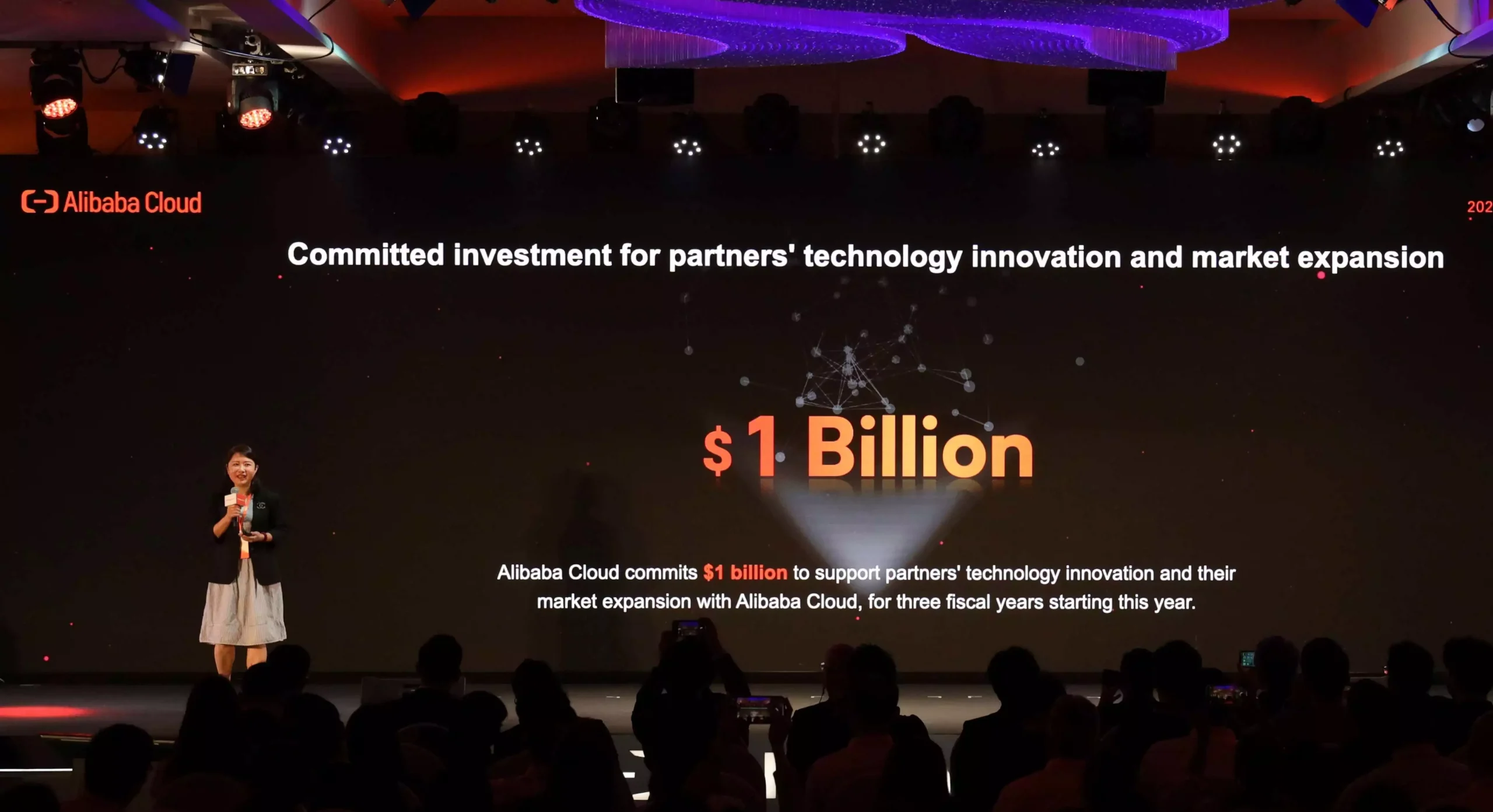TECHNOLOGY
Alibaba Cloud unveils strategic roadmap for international business

Alibaba Cloud, the digital technology and intelligence backbone of Alibaba Group, has announced its latest international strategic roadmap at the 2022 Alibaba Cloud Summit.
During the three-day summit, the trusted cloud provider has revealed new products to support technology innovation among enterprises, an investment of $1 billion for a global partner ecosystem upgrade, and enhanced customer services to provide comprehensive support throughout a customer’s digitalisation journey.
Technology innovation to power rapidly increasing cloud consumption
With more enterprises moving to the cloud and an increase in demand for cloud services in a hybrid environment, Alibaba Cloud has made available globally a series of its proven infrastructure products, a multi-model cloud-native database and distributed cloud services. This range of new products aims to provide enterprise customers with a wider scope of cloud services covering network, storage and compute.
Cloud Enterprise Network (CEN) 2.0, the newly available network services, provides global intelligent networking to support enterprises’ global expansion. CEN 2.0 supports ultra-large-scale networking capabilities with higher availability, lower latency, enhanced security capability and greater flexibility in pricing options for enterprises, compared to the previous version.
Alibaba Cloud has also unveiled a storage product called ESSD Auto PL, which provides block storage services and supports automatic scaling within seconds to allow businesses to handle sudden traffic surges. As the world’s leading elastic block storage product with auto-scaling function, it offers up to one million IOPS (input/output operations per second), significantly higher than the industry average.
Lindorm, the cloud-native multi-model database developed by Alibaba Cloud, successfully supported Alibaba Group’s 11.11, the world’s largest shopping festival, last year. Designed for fusion-processing requirements for wide tables, time series, space-time and various unstructured data, Lindorm has also been supporting customers in various industries in China – including automotive, finance and manufacturing – thanks to its high availability and low storage cost.
Alibaba Cloud also introduced ACK One (Alibaba Cloud Distributed Cloud Container Platform), a multi-region and multi-cluster container management platform to provide a consistent management, delivery and operation experience for enterprises. It allows users to implement container cluster management, resource scheduling, data disaster recovery and application delivery through a unified platform, whether in a public cloud, private cloud or on-premise environment. ACK One is the latest addition to ACK Anywhere, Alibaba Cloud Container Service for Kubernetes. Earlier this year, among the eight significant industry players evaluated, Alibaba Cloud was named a “Leader” in The Forrester Wave™ Public Cloud Container Platforms Q1 2022 for the first time.
Lastly, to support enterprises’ need for hybrid cloud, CloudBox integrates Alibaba Cloud’s public cloud infrastructure technologies such as compute, storage and network to provide enterprises with fully managed cloud services for deployment close to customers’ business premises. CloudBox delivers a consistent experience as Alibaba Cloud’s public cloud, while meeting enterprises’ demand for on-premise data processing and low latency compute. CloudBox is designed for multinational companies with business operations in China.
Alibaba Cloud has been strengthening its capabilities in computing, storage, network and security. For example, its recently unveiled Cloud Infrastructure Processing Unit (CIPU), a dedicated processing unit designed for its Apsara Cloud operating system, can reduce network latency to as low as five microseconds and improve computing power performance in data-intensive AI and data analytics scenarios by as much as 30%.
Prioritising partner benefits to build inclusive technology ecosystem
With its revamped ecosystem strategy, Alibaba Cloud has announced that it is committed to investing USD1 billion to support partners’ technology innovation and their market expansion with Alibaba Cloud in the coming three fiscal years. This investment consists of both financial and non-financial incentives, such as funding, rebates and go-to-market initiatives.
To accelerate partners’ growth, Alibaba Cloud also launched a “Regional Accelerator” program to provide partners operating in different markets with a localised business collaboration model. The model is designed around factors such as a market’s level of technical maturity, vertical focus, digitalisation needs and business demands, with an aim to boost partners’ income and strengthen their technical expertise. Alibaba Cloud ecosystem partners including resellers, technology partners (ISV, SaaS and SI), service and consulting partners can benefit from the program.
Selina Yuan, Alibaba Cloud Intelligence International President, said: “Partners have always been a key focus for Alibaba Cloud, and we are committed to providing them with strong support for our ongoing co-creation and value-add – both technologically and commercially – to further empower our joined customers.
“Our revamped partner strategy prioritises our partners’ growth. By continuing to support our partners’ business expansion, we can build an inclusive ecosystem benefiting partners and customers.”
To address complications with partners’ international business operations, Alibaba Cloud has also upgraded its collaboration model with its ISV partners, with a focus on enhancing industry collaboration, standardising go-to-market process, and accelerating technical solution integration to increase efficiency. Looking ahead, Alibaba Cloud hopes to recruit more financial services, retail, internet and manufacturing ISVs to co-develop products and support customer innovation.
Alibaba Cloud currently works with about 11,000 partners worldwide, including Salesforce, VMware, Fortinet, IBM and Neo4j.
Empowering customers with comprehensive support
In order to provide all-round cloud-based solutions and services to all customers, Alibaba Cloud also launched a “Global Delivery and Service Program” to enhance the cloud adoption process for customers. Under the program, it has unveiled three Customer Service Centers in Kuala Lumpur (Malaysia), Porto (Portugal), and Mexico City (Mexico), to support customers in their cloud adoption journey, providing timely and regionalised cloud migration and consulting services.
In addition to the Customer Service Centers, Alibaba Cloud has set up three Service Delivery Centers in Kuala Lumpur (Malaysia), Dubai (United Arab Emirates) and Hong Kong (Greater China), to provide extra technology support to its regional offices and customer project delivery in Asia Pacific and the Middle East, Europe and Africa.
Fueling new innovations with reliable infrastructure
During the summit, Alibaba Cloud has inked nearly 30 agreements to help customers and partners accelerate their digital innovation capabilities with leading cloud computing technologies.
In collaboration with JP Games, Japan’s leading game development studio, Alibaba Cloud has unveiled a set of new services to create virtual spaces and realistic avatars for global customers venturing into the metaverse.
Together with MetaverseXR, Thailand’s leading metaverse company, Alibaba Cloud rolled out a comprehensive suite of metaverse solutions for the Thai market in order to fulfill growing local demand for embarking on a Web 3.0 journey.
Alibaba Cloud also teamed up with UMG Group in Myanmar, to power the country’s digital transformation – especially in traditional industries.
With BeLive and VisionTech from Singapore, Alibaba Cloud is expanding its regional outreach in the media and Fintech verticals.
Alibaba Cloud is collaborating with OnFinality, a leading New Zealand-based blockchain infrastructure provider, to offer robust cloud-computing capability and a strong global network for Web 3.0 developers looking to scale globally.
More than 300 Alibaba Cloud customers and partners around the globe are attending the summit, including Accenture, Tiger Brokers, DANA, Thai Data, and Lala station.
Source link
TECHNOLOGY
Next-gen chips, Amazon Q, and speedy S3

AWS re:Invent, which has been taking place from November 27 and runs to December 1, has had its usual plethora of announcements: a total of 21 at time of print.
Perhaps not surprisingly, given the huge potential impact of generative AI – ChatGPT officially turns one year old today – a lot of focus has been on the AI side for AWS’ announcements, including a major partnership inked with NVIDIA across infrastructure, software, and services.
Yet there has been plenty more announced at the Las Vegas jamboree besides. Here, CloudTech rounds up the best of the rest:
Next-generation chips
This was the other major AI-focused announcement at re:Invent: the launch of two new chips, AWS Graviton4 and AWS Trainium2, for training and running AI and machine learning (ML) models, among other customer workloads. Graviton4 shapes up against its predecessor with 30% better compute performance, 50% more cores and 75% more memory bandwidth, while Trainium2 delivers up to four times faster training than before and will be able to be deployed in EC2 UltraClusters of up to 100,000 chips.
The EC2 UltraClusters are designed to ‘deliver the highest performance, most energy efficient AI model training infrastructure in the cloud’, as AWS puts it. With it, customers will be able to train large language models in ‘a fraction of the time’, as well as double energy efficiency.
As ever, AWS offers customers who are already utilising these tools. Databricks, Epic and SAP are among the companies cited as using the new AWS-designed chips.
Zero-ETL integrations
AWS announced new Amazon Aurora PostgreSQL, Amazon DynamoDB, and Amazon Relational Database Services (Amazon RDS) for MySQL integrations with Amazon Redshift, AWS’ cloud data warehouse. The zero-ETL integrations – eliminating the need to build ETL (extract, transform, load) data pipelines – make it easier to connect and analyse transactional data across various relational and non-relational databases in Amazon Redshift.
A simple example of how zero-ETL functions can be seen is in a hypothetical company which stores transactional data – time of transaction, items bought, where the transaction occurred – in a relational database, but use another analytics tool to analyse data in a non-relational database. To connect it all up, companies would previously have to construct ETL data pipelines which are a time and money sink.
The latest integrations “build on AWS’s zero-ETL foundation… so customers can quickly and easily connect all of their data, no matter where it lives,” the company said.
Amazon S3 Express One Zone
AWS announced the general availability of Amazon S3 Express One Zone, a new storage class purpose-built for customers’ most frequently-accessed data. Data access speed is up to 10 times faster and request costs up to 50% lower than standard S3. Companies can also opt to collocate their Amazon S3 Express One Zone data in the same availability zone as their compute resources.
Companies and partners who are using Amazon S3 Express One Zone include ChaosSearch, Cloudera, and Pinterest.
Amazon Q
A new product, and an interesting pivot, again with generative AI at its core. Amazon Q was announced as a ‘new type of generative AI-powered assistant’ which can be tailored to a customer’s business. “Customers can get fast, relevant answers to pressing questions, generate content, and take actions – all informed by a customer’s information repositories, code, and enterprise systems,” AWS added. The service also can assist companies building on AWS, as well as companies using AWS applications for business intelligence, contact centres, and supply chain management.
Customers cited as early adopters include Accenture, BMW and Wunderkind.
Want to learn more about cybersecurity and the cloud from industry leaders? Check out Cyber Security & Cloud Expo taking place in Amsterdam, California, and London. Explore other upcoming enterprise technology events and webinars powered by TechForge here.
TECHNOLOGY
HCLTech and Cisco create collaborative hybrid workplaces

Digital comms specialist Cisco and global tech firm HCLTech have teamed up to launch Meeting-Rooms-as-a-Service (MRaaS).
Available on a subscription model, this solution modernises legacy meeting rooms and enables users to join meetings from any meeting solution provider using Webex devices.
The MRaaS solution helps enterprises simplify the design, implementation and maintenance of integrated meeting rooms, enabling seamless collaboration for their globally distributed hybrid workforces.
Rakshit Ghura, senior VP and Global head of digital workplace services, HCLTech, said: “MRaaS combines our consulting and managed services expertise with Cisco’s proficiency in Webex devices to change the way employees conceptualise, organise and interact in a collaborative environment for a modern hybrid work model.
“The common vision of our partnership is to elevate the collaboration experience at work and drive productivity through modern meeting rooms.”
Alexandra Zagury, VP of partner managed and as-a-Service Sales at Cisco, said: “Our partnership with HCLTech helps our clients transform their offices through cost-effective managed services that support the ongoing evolution of workspaces.
“As we reimagine the modern office, we are making it easier to support collaboration and productivity among workers, whether they are in the office or elsewhere.”
Cisco’s Webex collaboration devices harness the power of artificial intelligence to offer intuitive, seamless collaboration experiences, enabling meeting rooms with smart features such as meeting zones, intelligent people framing, optimised attendee audio and background noise removal, among others.
Want to learn more about cybersecurity and the cloud from industry leaders? Check out Cyber Security & Cloud Expo taking place in Amsterdam, California, and London. Explore other upcoming enterprise technology events and webinars powered by TechForge here.
TECHNOLOGY
Canonical releases low-touch private cloud MicroCloud

Canonical has announced the general availability of MicroCloud, a low-touch, open source cloud solution. MicroCloud is part of Canonical’s growing cloud infrastructure portfolio.
It is purpose-built for scalable clusters and edge deployments for all types of enterprises. It is designed with simplicity, security and automation in mind, minimising the time and effort to both deploy and maintain it. Conveniently, enterprise support for MicroCloud is offered as part of Canonical’s Ubuntu Pro subscription, with several support tiers available, and priced per node.
MicroClouds are optimised for repeatable and reliable remote deployments. A single command initiates the orchestration and clustering of various components with minimal involvement by the user, resulting in a fully functional cloud within minutes. This simplified deployment process significantly reduces the barrier to entry, putting a production-grade cloud at everyone’s fingertips.
Juan Manuel Ventura, head of architectures & technologies at Spindox, said: “Cloud computing is not only about technology, it’s the beating heart of any modern industrial transformation, driving agility and innovation. Our mission is to provide our customers with the most effective ways to innovate and bring value; having a complexity-free cloud infrastructure is one important piece of that puzzle. With MicroCloud, the focus shifts away from struggling with cloud operations to solving real business challenges” says
In addition to seamless deployment, MicroCloud prioritises security and ease of maintenance. All MicroCloud components are built with strict confinement for increased security, with over-the-air transactional updates that preserve data and roll back on errors automatically. Upgrades to newer versions are handled automatically and without downtime, with the mechanisms to hold or schedule them as needed.
With this approach, MicroCloud caters to both on-premise clouds but also edge deployments at remote locations, allowing organisations to use the same infrastructure primitives and services wherever they are needed. It is suitable for business-in-branch office locations or industrial use inside a factory, as well as distributed locations where the focus is on replicability and unattended operations.
Cedric Gegout, VP of product at Canonical, said: “As data becomes more distributed, the infrastructure has to follow. Cloud computing is now distributed, spanning across data centres, far and near edge computing appliances. MicroCloud is our answer to that.
“By packaging known infrastructure primitives in a portable and unattended way, we are delivering a simpler, more prescriptive cloud experience that makes zero-ops a reality for many Industries.“
MicroCloud’s lightweight architecture makes it usable on both commodity and high-end hardware, with several ways to further reduce its footprint depending on your workload needs. In addition to the standard Ubuntu Server or Desktop, MicroClouds can be run on Ubuntu Core – a lightweight OS optimised for the edge. With Ubuntu Core, MicroClouds are a perfect solution for far-edge locations with limited computing capabilities. Users can choose to run their workloads using Kubernetes or via system containers. System containers based on LXD behave similarly to traditional VMs but consume fewer resources while providing bare-metal performance.
Coupled with Canonical’s Ubuntu Pro + Support subscription, MicroCloud users can benefit from an enterprise-grade open source cloud solution that is fully supported and with better economics. An Ubuntu Pro subscription offers security maintenance for the broadest collection of open-source software available from a single vendor today. It covers over 30k packages with a consistent security maintenance commitment, and additional features such as kernel livepatch, systems management at scale, certified compliance and hardening profiles enabling easy adoption for enterprises. With per-node pricing and no hidden fees, customers can rest assured that their environment is secure and supported without the expensive price tag typically associated with cloud solutions.
Want to learn more about cybersecurity and the cloud from industry leaders? Check out Cyber Security & Cloud Expo taking place in Amsterdam, California, and London. Explore other upcoming enterprise technology events and webinars powered by TechForge here.
-

 PPC5 days ago
PPC5 days ago19 Best SEO Tools in 2024 (For Every Use Case)
-
SEARCHENGINES7 days ago
Daily Search Forum Recap: April 17, 2024
-
SEARCHENGINES6 days ago
Daily Search Forum Recap: April 18, 2024
-
SEARCHENGINES5 days ago
Daily Search Forum Recap: April 19, 2024
-

 MARKETING6 days ago
MARKETING6 days agoEcommerce evolution: Blurring the lines between B2B and B2C
-

 SEO6 days ago
SEO6 days ago2024 WordPress Vulnerability Report Shows Errors Sites Keep Making
-

 WORDPRESS5 days ago
WORDPRESS5 days agoHow to Make $5000 of Passive Income Every Month in WordPress
-

 WORDPRESS6 days ago
WORDPRESS6 days ago10 Amazing WordPress Design Resouces – WordPress.com News















You must be logged in to post a comment Login